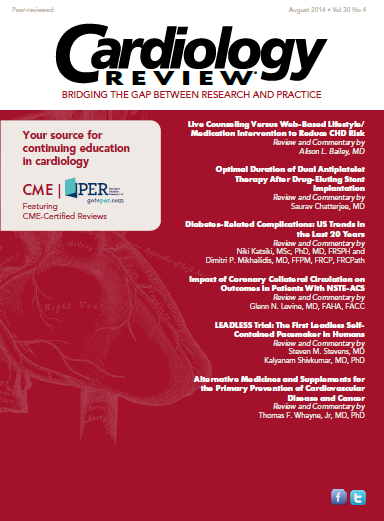Publication
Article
What Does the Future Hold for a Once Promising Hypertension Treatment
Author(s):
In their recent article published in the Journal of the American College of Cardiology, Vivek Y. Reddy, MD, and Jeffrey W. Olin, DO, noted "there are few areas in medicine that have gained as much prominence as quickly, or have been as widely dismissed as quickly, as catheter-based renal sympathetic denervation for the treatment of resistant hypertension.

Mike Hennessy
In their recent article published in the Journal of the American College of Cardiology, Vivek Y. Reddy, MD, and Jeffrey W. Olin, DO, noted “there are few areas in medicine that have gained as much prominence as quickly, or have been as widely dismissed as quickly, as catheter-based renal sympathetic denervation (RDN) for the treatment of resistant hypertension.” Despite promising early results from the SYMPLICITY HTN-1 and -2 trials showing rather dramatic decrease in blood pressure in patients with resistant hypertension who were treated with RDN, Reddy and Olin noted that “enthusiasm surrounding RDN for resistant hypertension virtually evaporated overnight with the publication of the single-blind, randomized, sham-controlled trial SYMPLICITY HTN-3.” In this trial, treatment with RDN produced no significant change in systolic blood pressure at six months.
Yet, despite this setback, there continues to be much interest and discussion around this topic, as many clinicians and researchers have raised questions about the SYMPLICITY HTN-3 study results and cautioned colleagues not to write off the procedure based on these initial results. Others have pointed out that the techniques and devices used with RDN are rapidly improving, which in light of more promising one-year results from the SYMPLICITY HTN-3 study, gives hope that there may yet be better options for patients with resistant hypertension.
In the Clinical Forum Q&A in this issue, several Cardiology Review board members weigh in with their thoughts on the role of renal denervation for the treatment of resistant hypertension. Hitinder S. Gurm, MD, Director of Inpatient Cardiology Services and Director of Carotid Interventions in Cardiovascular Medicine for the Division of Cardiovascular Medicine at the University of Michigan, notes that “catheter-based renal denervation is a novel concept and may yet prove to be a major breakthrough for the treatment of select patient populations,” having shown particular promise in patients with arrhythmias and for patients with heart failure. With patient non-compliance with medication-based therapy for hypertension playing a huge role in the poor outcomes seen in this patient population, Gurm notes, should it be more convincingly demonstrated that RDN can successfully reduce blood pressure, because this therapy is independent of patient compliance, it “could be highly effective in reducing morbidity (and possibly mortality), as well as health care costs associated with poorly controlled hypertension.”
Mehdi H. Shishehbor, DO, MPH, PhD, Director of Endovascular Services and Associate Program Director of Interventional Cardiology at the Cleveland Clinic Heart and Vascular Institute, offers a careful review of the SYMPLICITY HTN-3 results, asking if they were “related to patient demographics, operator experience, catheter design, trial design, the Hawthorne effect, regression to the mean, adherence, or just placebo effect.” Shishehbor tackles each of these possibilities in turn, offering valuable insight and analysis.
I invite readers to examine the complete version of the Clinical Forum Q&A for an in-depth discussion of this topic. As additional research is published from trials that “utilize different devices, consider racial differences among patients, and are powered to detect smaller differences between groups” (to quote another contributor to the Clinical Forum), I am sure we will revisit this topic in the future.)
Thank you for reading.
Mike Hennessy
Chairman and CEO






